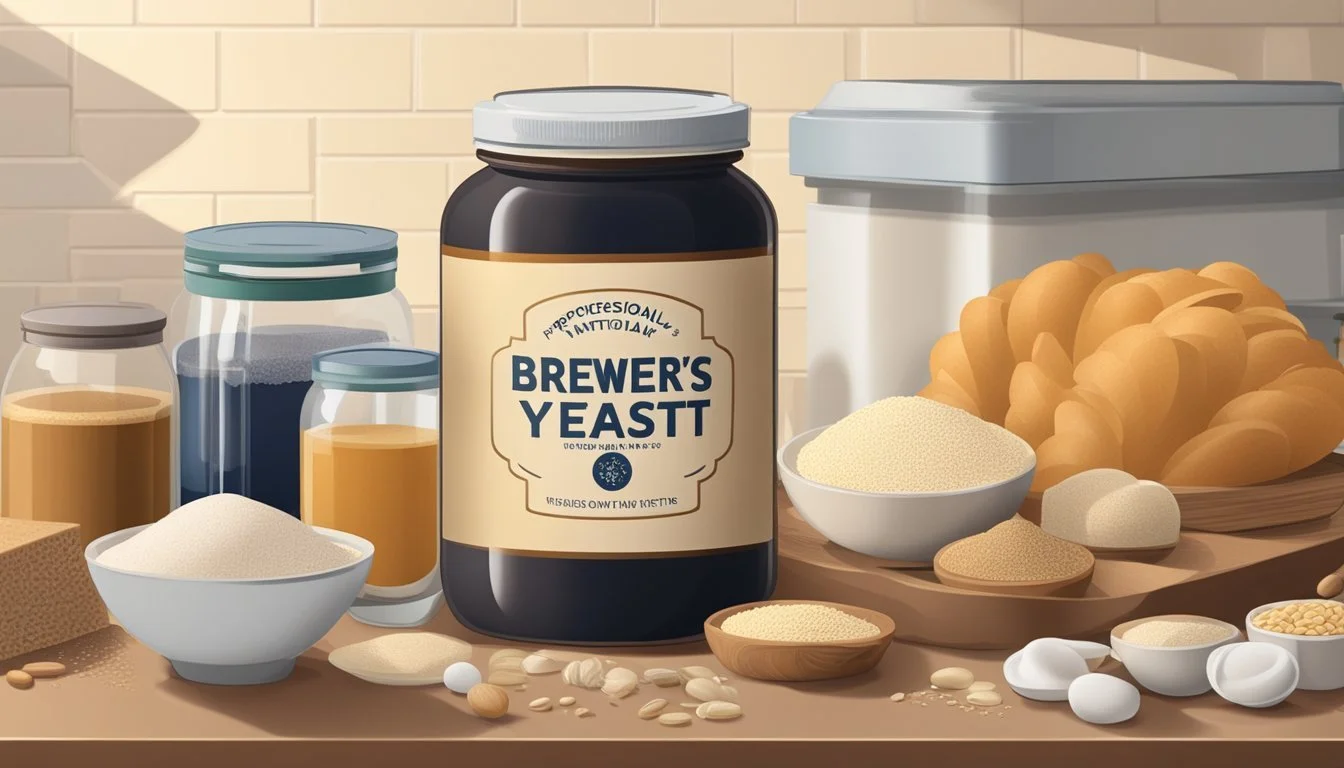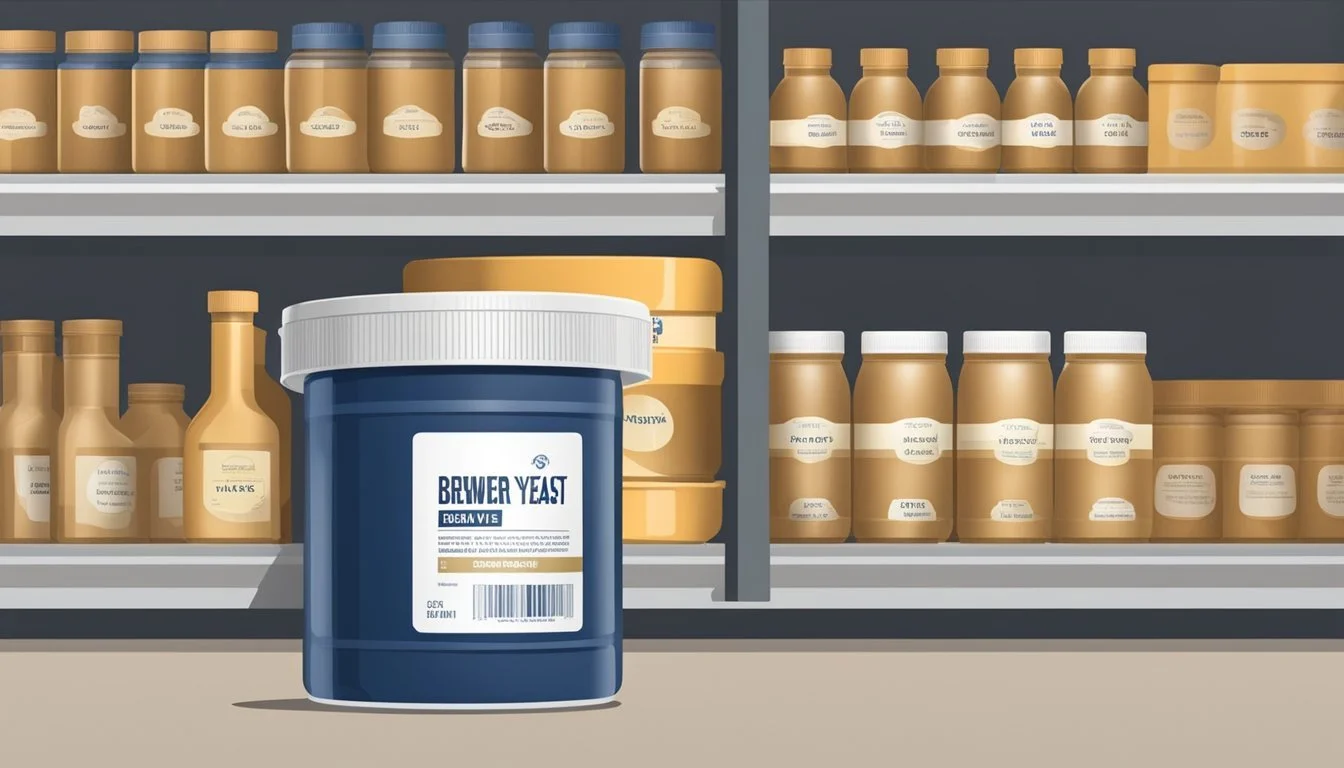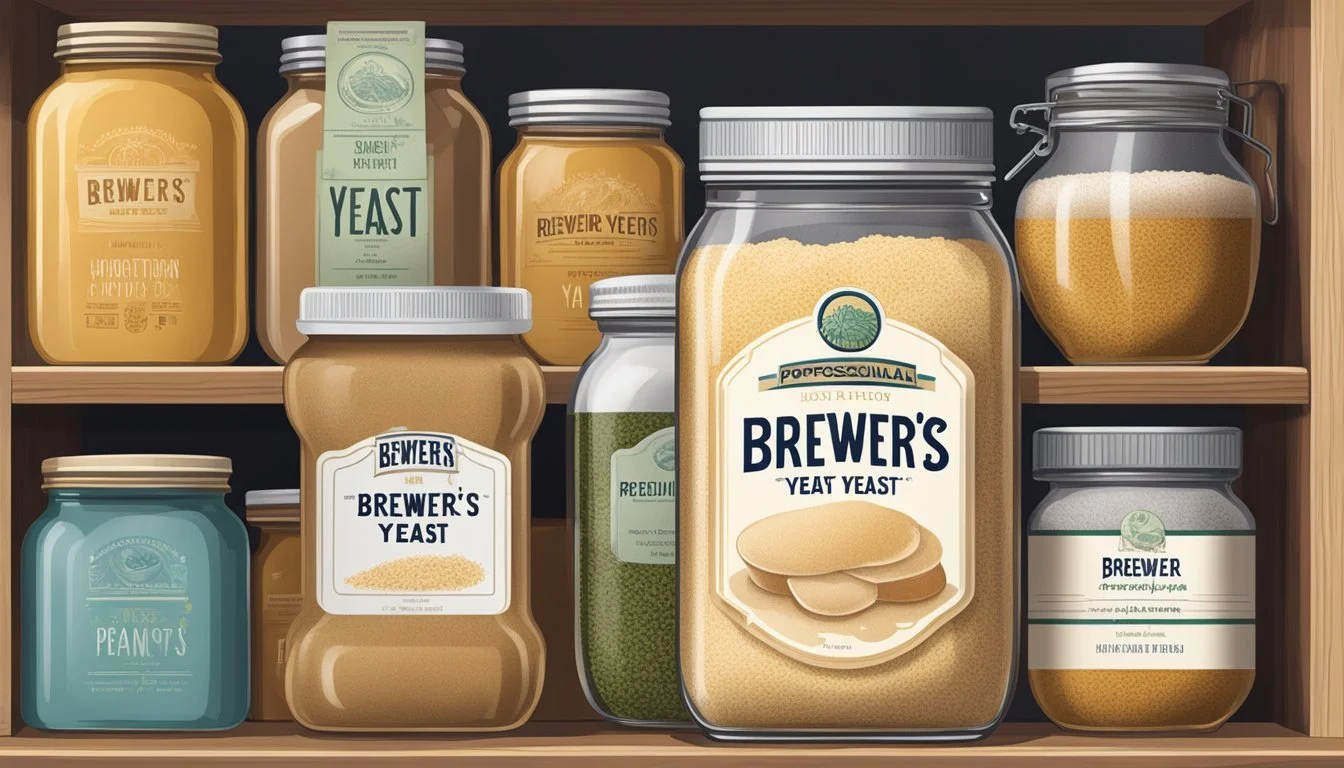Does Brewer's Yeast Go Bad?
Shelf Life and Storage Tips
Brewer's yeast, known scientifically as Saccharomyces cerevisiae, is a popular nutritional supplement and ingredient in food and beverages. Yes, brewer's yeast does expire, and its efficacy decreases over time if not stored properly. This living organism contains active cultures that gradually die, rendering the yeast ineffective for its intended uses.
When stored in a cool and dry place, dry brewer's yeast can last for 12-18 months. Keeping it in a refrigerator can extend its shelf life up to a year longer if the packaging remains tightly sealed. In contrast, fresh brewer's yeast has a much shorter lifespan, usable only within 10 days.
Brewer's yeast offers various health benefits, including potential improvements in blood sugar levels and blood pressure. However, consuming expired brewer's yeast may not provide these benefits and could lead to mild side effects like excess gas, bloating, and headaches. Understanding its shelf life is crucial for maximizing its health benefits and avoiding potential risks.
What Is Brewer's Yeast?
Brewer's yeast, scientifically known as Saccharomyces cerevisiae, is a type of fungus commonly used in brewing beer. It is valued for its rich nutritional profile, which includes vitamins, minerals, and proteins.
Brewer's Yeast Properties
Brewer's yeast is created through the fermentation process. This yeast is available in various forms, such as powder, flakes, tablets, and capsules. It contains a high amount of B vitamins like B1, B2, B3, B5, B6, B7, B9, and B12.
Chromium is another essential component, playing a role in the body's ability to regulate blood sugar. Folic acid, iron, selenium, potassium, and magnesium are some of the critical minerals found in brewer's yeast. The high protein content, which includes all the essential amino acids, makes it particularly valuable as a nutritional supplement.
Health Benefits
Brewer's yeast offers several health benefits. It can help stabilize blood sugar levels due to its chromium content, which is beneficial for people with diabetes. Additionally, the fiber in brewer's yeast, including beta-glucan, aids in digestion.
Rich in B vitamins, brewer's yeast supports energy production and cellular function. Iron in the yeast helps in the formation of red blood cells, while selenium supports the immune system. Potassium and magnesium contribute to heart health and muscle function.
Moreover, some studies suggest that brewer's yeast can help lower blood pressure and boost immunity. It may alleviate symptoms of respiratory infections and enhance overall well-being.
Nutritional Profile
Brewer's yeast boasts a robust nutritional profile, including a variety of essential vitamins, minerals, proteins, and carbohydrates. Below, we break down the key components, giving an in-depth look at this supplement's nutritional value.
Vitamin and Mineral Content
Brewer's yeast is rich in B vitamins, which are vital for energy production and maintaining healthy skin, hair, and eyes. Key B vitamins found include thiamine (B1), riboflavin (B2), niacin (B3), and folic acid. These vitamins support various metabolic processes and overall well-being.
It also contains essential minerals such as chromium, which may help regulate blood sugar levels, and iron, important for oxygen transport in the blood.
Vitamin Content:
Thiamine (B1)
Riboflavin (B2)
Niacin (B3)
Folic Acid
Mineral Content:
Chromium
Iron
Protein and Carbohydrates
Brewer's yeast is an excellent source of protein, making it beneficial for muscle repair and growth. It contains all nine essential amino acids, which are the building blocks of protein.
Additionally, it has a modest amount of carbohydrates primarily in the form of fiber, aiding in digestion. This high fiber content contributes to gut health and helps in maintaining a balanced diet.
Protein Content:
Complete source of essential amino acids
Carbohydrate Content:
High in fiber
This combination of protein and fiber makes brewer's yeast a valuable addition to a balanced diet.
Health Benefits and Uses
Brewer's yeast, rich in essential nutrients, offers a variety of health benefits. It supports metabolic and cardiovascular functions, aids digestion, boosts skin health and energy levels, and enhances immunity and general wellbeing.
Metabolic and Cardiovascular Support
Brewer's yeast contains high levels of chromium, which helps regulate blood sugar levels, benefiting those with Type 2 Diabetes. It assists in insulin production and reduces blood glucose levels.
Magnesium and potassium in brewer's yeast contribute to maintaining healthy blood pressure. These minerals support cardiovascular health.
Moreover, the B vitamins found in brewer's yeast facilitate energy production and metabolic processes, ensuring efficient body function.
Digestive Health
Brewer's yeast is a potent source of probiotics. These beneficial bacteria enhance gut health by improving digestion and nutrient absorption.
It can help alleviate digestive disorders such as irritable bowel syndrome (IBS) and constipation. Its high fiber content aids in maintaining bowel regularity.
Brewer's yeast also contains enzymes that help break down food, further supporting the digestive system and contributing to overall gastrointestinal health.
Skin and Energy Boost
Rich in B vitamins, brewer's yeast promotes skin health and overall energy levels. Biotin in brewer's yeast supports healthy hair, skin, and nails, enhancing appearance and texture.
Thiamine and riboflavin are essential for energy metabolism, helping convert carbohydrates into energy. This can lead to increased vitality and reduced fatigue.
The antioxidants present in brewer's yeast also protect the skin from oxidative stress, reducing signs of aging and improving skin tone.
Immunity and General Wellbeing
Brewer's yeast strengthens the immune system through its high content of selenium and zinc, which are crucial for immune function and antioxidant protection.
Its rich vitamin and mineral profile contributes to general wellbeing by supporting numerous bodily functions. The presence of B vitamins, including niacin and folic acid, further enhances mood and cognitive function.
In summary, brewer's yeast is a multifaceted supplement that supports various aspects of health and wellbeing, making it a valuable addition to a balanced diet.
Potential Side Effects and Interactions
Supplementing with brewer's yeast offers various benefits but may also come with potential side effects and interactions, especially when taken alongside certain medications.
Common Side Effects
Brewer's yeast is generally safe for most people, but some may experience mild side effects like:
Excess gas: This can lead to bloating and discomfort.
Diarrhea: Occasional loose stools may occur, especially when starting the supplement.
Headaches: Some users report migraines or headache symptoms.
In rare cases, an allergic reaction might occur, leading to symptoms such as hives, itchy skin, or nasal blockage. If any of these symptoms appear, discontinue use and seek medical advice.
Drug Interactions
Brewer's yeast may interact with several medications. Key interactions include:
Monoamine Oxidase Inhibitors (MAOIs): Drugs like Selegiline and Isocarboxazid can lead to a hypertensive crisis when taken with brewer's yeast. This dangerous increase in blood pressure requires immediate medical attention.
Meperidine: An interaction with this pain medication can lead to severe side effects, including potential serotonin syndrome.
Hypoglycemic agents: Brewer’s yeast might enhance the effects of diabetes medications, leading to hypoglycemia if not monitored closely.
Precautions for Specific Groups
Certain groups need to exercise caution when using brewer's yeast:
Pregnant or breastfeeding women: The safety of brewer's yeast has not been well-studied in these groups, so they should consult a healthcare provider.
Individuals with weakened immune systems: This group might be more susceptible to infections or adverse reactions.
People with allergies to yeast: An allergic reaction could lead to severe symptoms like swelling or throat constriction, requiring emergency medical attention.
Always discuss with a healthcare provider before starting brewer's yeast to ensure it's safe, especially if taking other medications or belonging to a sensitive group.
Proper Storage and Shelf Life
Proper storage is essential to maintain the quality and effectiveness of brewer's yeast. The shelf life varies depending on the form of the yeast, such as liquid, dry, or tablet, and correct storage methods can extend their usability.
Storing Different Forms of Brewer's Yeast
Liquid Brewer's Yeast: This form has the shortest shelf life, generally lasting 3 to 6 months. Liquid yeast should always be stored in the refrigerator to maintain its viability.
Dry Brewer's Yeast: Dry yeast, including active dry yeast, has a longer shelf life of 12 to 18 months if unopened. Once opened, it can be kept in the refrigerator for up to a year but is best used within 4 months for optimal performance.
Tablet and Flake Brewer's Yeast: These forms should be kept in a cool, dark place, away from moisture. Packed tablets and flakes can last up to two years if stored properly in airtight containers.
Freezing dry yeast can extend its shelf life even further, though it should be sealed tightly to prevent moisture buildup.
Signs of Spoilage
Color and Texture Changes: Spoiled brewer's yeast may show signs of discoloration or changes in texture, becoming clumpy or forming a crust.
Off Smell: A sour or off-putting odor indicates the yeast has gone bad and should not be used. Healthy yeast typically has a mild, somewhat nutty scent.
Reduced Activity: If the yeast fails to bubble or foam when activated, it is likely expired and no longer effective. Testing a small batch with warm water and sugar can confirm its viability.
Expiry Date: Always check the expiration date on the packaging. Using yeast past this date can result in poor fermentation or baking outcomes.
Culinary Uses
Brewer's yeast is not only utilized in brewing but also adds unique flavors and nutritional benefits to various culinary preparations. Its versatility extends from creating flavorful beers to enhancing baked goods and providing dietary supplements.
Brewing Beer and Baking
Brewer's yeast plays a critical role in brewing beer by fermenting sugars to produce alcohol and carbon dioxide. It contributes to the beer's flavor, aroma, and mouthfeel. Varieties of brewer's yeast, such as ale yeast and lager yeast, are selected depending on the desired beer style.
In baking, brewer's yeast can be used to leaven bread. It imparts a distinct, sometimes bitter taste that can add complexity to the flavor profile. While it acts similarly to baker's yeast, brewer's yeast is often richer in nutrients like protein, fiber, and B vitamins. Some bakers prefer it for its robust texture and taste, experimenting with it in different recipes for unique results.
Alternative Dietary Supplement
Brewer's yeast is also used as a nutritional supplement. It contains B vitamins, protein, and minerals, making it a popular choice for boosting dietary intake. When sprinkled on food or mixed into drinks like juice, it offers a natural way to enhance one's nutrient profile.
It's considered a nutritional yeast due to its health benefits, supporting energy levels and skin health. Its slightly bitter flavor can complement or enhance savory dishes, providing both nutritional and culinary advantages. As a supplement, it's available in various forms, including powders and flakes, making it easy to incorporate into daily meals.
Comparing Brewer's Yeast with Other Yeasts
Brewer's yeast is distinct from both nutritional yeast and baker's yeast. Each type of yeast has unique characteristics, uses, and nutritional profiles.
Brewer's Yeast vs. Nutritional Yeast
Brewer's yeast is primarily used in brewing beer. It has a bitter taste and is sold as a dietary supplement rich in B vitamins and minerals. Nutritional yeast, on the other hand, is a deactivated yeast grown specifically to be used as a food product.
Brewer's yeast often comes in a powder or flake form and can be found in health food stores. Nutritional yeast has a cheesy, nutty flavor and is often fortified with additional vitamins, including vitamin B12, which brewer's yeast lacks.
Key differences:
Brewer's yeast: Bitter taste, high in B vitamins but lacks B12, used in brewing.
Nutritional yeast: Cheesy flavor, fortified with B12, used as a food seasoning.
Brewer's Yeast vs. Baker's Yeast
Baker's yeast, commonly known as active dry yeast, is used in baking to help dough rise. It is active and alive when used, unlike the deactivated brewer's yeast. Brewer's yeast is also used during fermentation but is killed off during the beer-making process.
Brewer's yeast can be bitter and is primarily sold as a supplement, whereas baker's yeast has no strong taste and is vital for baking.
Key differences:
Brewer's yeast: Used in brewing, bitter, sold as a supplement.
Baker's yeast: Used in baking, helps dough rise, active yeast.
These comparisons highlight the unique characteristics and uses of brewer's yeast relative to other common yeasts.
Choosing a Brewer's Yeast Supplement
When selecting a brewer's yeast supplement, it is essential to consider the different forms and varieties available. Each type has its unique characteristics and potential benefits.
Forms and Varieties
Brewer's yeast supplements are available in various forms including tablets, capsules, powder, liquid, and flakes. Tablets and capsules are convenient for daily dosing and often come with specified potency levels. Powders and flakes can be easily mixed into food or beverages.
Liquid brewer's yeast can provide a quick and easily absorbable option. Each form may contain different additives, so it is important to check for any unwanted ingredients. Consulting a doctor before beginning any new supplement is advisable, especially to avoid any interactions with existing medications.
From these options, users can choose based on their preference for ease of use, method of consumption, and specific health goals.
FAQs and Common Concerns
Brewer's yeast does have a shelf life and its efficacy can be affected by storage conditions. Here are some common concerns and misconceptions addressed.
Addressing Common Misconceptions
Expiration and Efficacy
Brewer's yeast can indeed expire, losing its effectiveness over time. Dry yeast generally lasts 12 to 18 months unopened and can be used up to one year after opening if kept refrigerated. Liquid yeast, however, has a shorter shelf life of 3 to 6 months.
Health Effects and Safety
Brewer's yeast has been studied for its potential health effects, including modest improvements in blood sugar levels and blood pressure. It is not poisonous if used past expiration, but its efficacy diminishes. Pregnant or breastfeeding women, and those with gout, yeast infections, Crohn’s disease, irritable bowel syndrome, or colitis, should consult healthcare providers before using it.
Allergies and Immune System Concerns
Some individuals may have allergies, causing symptoms like rash or swelling. Those with a weakened immune system should be cautious. Though rare, brewer's yeast can cause allergic reactions. Always test a small amount initially if using it for the first time or consult a healthcare professional.
Weight Loss and Cholesterol
Brewer's yeast is sometimes touted for weight loss and cholesterol reduction. While it can support metabolism due to its high B-vitamin content, relying solely on it for significant weight loss or cholesterol control without a balanced diet and regular exercise would be ineffective.










